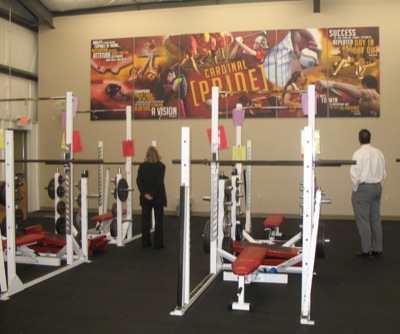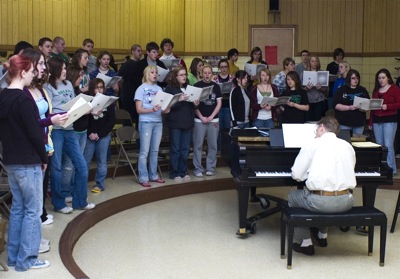Thursday, March 12th, 2009
Fort Recovery defers state building funds
By William Kincaid
FORT RECOVERY - School board members - for the fourth time - deferred accepting Ohio School Facilities Commission (OSFC) money for a school construction or renovation project.
With no plan in place, board members on Wednesday wrestled with the proposal for an hour-and-a-half and did not come to a consensus. Some were reluctant to discuss, as silence filled periods of the discussion during the work session before the regular school board meeting.
The OSFC wanted to know by the end of this week whether Fort Recovery would participate in a $4.3 million school construction or renovation project that would have had the state picking up 79 percent of the total cost.
Board members Jack Staugler and Dave Hull voted yes to accept funding, while Steve Wendel, Dan Kahlig and Dan Jutte all voted no.
During the evening, Staugler and Kahlig both changed their minds before voting.
"Funds are not necessarily guaranteed in the future," said Brad Garmann of Garmann/Miller & Associates, Minster.
"The money is of some question - I really do need to tell you that," Superintendent Dave Riel added. "They're (OSFC) ready to scratch Fort Recovery off the list."
Last year at this time, board members deferred funding with the intention of accepting money this year.
Multiple open meetings with community members were held in 2006 and 2007 to gather ideas for future construction or renovation. No universal consensus was derived from those meetings, Riel said.
"What we need is a plan," Hull said, pointing out the board needs to make a commitment, one way or another, and have a direction.
If the board intends to eventually do a project, now is the time as the state is offering the best deal by funding 81 percent of the project, Hull said.
Jutte said construction material costs are significantly down right now. But then added he was still unsure about his vote.
"I'm confused right now," he said, before eventually voting no.
Staugler worried if school levies would pass. Not only would the school need to pass a construction levy, but also an operating levy in the near future.
"That's what people are going to want to know - how much money is it going to cost?" Treasurer Lori Koch said.
Most likely, a school project would require between 3 and 4 mills, she said. After further discussion, Koch and Riel said the school had two basic options - create a K-12 school or renovate the current high school.
Jutte wondered if the school could accept funding but drag its feet and delay putting a levy on the ballot until spring, giving the board more time. According to Miller, the school has one year after accepting funding to raise its share of the money.
Rudy Quinter, also of Garmann/Miller & Associates, said board members could take that lackadaisical approach and they would not be held to the fire.
But in his mind, it's only logical to try to get a levy passed as quickly as possible if that's what board members want.
If board members are not serious in attempting to raise their share of the money, they might as well defer funding and give themselves a full year to secure local funding through four attempts.
Asked how many times Fort Recovery can defer state money, Rick Savors of OSFC this morning told the newspaper "indefinitely."
He said the school will be offered another chance next year.
Wendel said all things considered, he wanted to defer until the school could look at further options more clearly.
"If we don't believe, we can't sell it," Jutte said.
Before the work session ended, high school Principal Dave Warvel said board members are the leaders and need to have a vision.
Dealing with high school problems:
FORT RECOVERY - Even if school board members never accept state funding for school construction or renovation, they are eventually going to have to deal with problems at the high school, a local architect said.
"There's some serious problems and some serious issues on some of the systems," Brad Garmann of Garmann/Miller & Associates, Minster, told school board members during a work session Wednesday night.
Sections of the current high school date back to 1935.
Some of the problems include the heating and air conditioning system, plumbing and roofing, Garmann said.
"My fear is something big is going to happen ... and we don't have it (money)," Treasurer Lori Koch said.
If school board members do not participate in an OSFC project, they need to start setting money aside for such looming capital projects, she said.
Superintendent David Riel said the high school membrane roof is on its last leg, as it is pulling away from the seams.
Garmann told board members a new boiler would cost between $60,000 and $70,000, while Riel quoted close to $1 million for other systems.
According to an OSFC assessment of the high school building done in 2006, the school needs a new $1.8 million heating system for the entire building, except for the vocational agriculture and freezer areas; a $325,000 roof; a new $1 million amp service for new power; $563,000 in new plumbing and fixtures; and $296,000 in ceiling replacements.
In a handout during a community engagement meeting in 2006, Riel wrote: "With increased educational options available to students ... it is less likely that students will continue to be attracted to attend a high school that is outdated."
- William Kincaid




